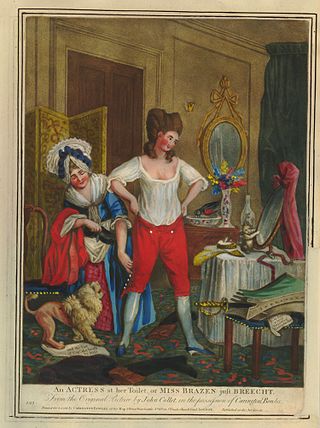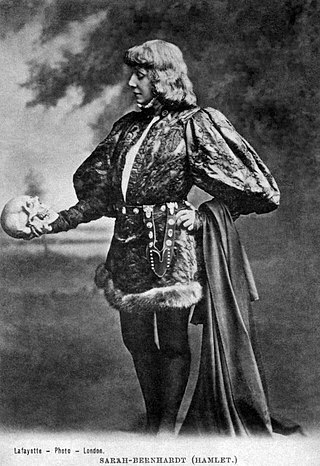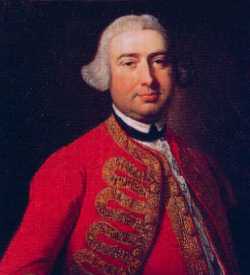Related Research Articles
A countertenor (also contra tenor) is a type of classical male singing voice whose vocal range is equivalent to that of the female contralto or mezzo-soprano voice types, generally extending from around G3 to D5 or E5, although a sopranist (a specific kind of countertenor) may match the soprano's range of around C4 to C6. Countertenors often have tenor or baritone chest voices, but sing in falsetto or head voice much more often than they do in their chest voice.

A breeches role is one in which an actress appears in male clothing. Breeches, tight-fitting knee-length pants, were the standard male garment at the time these roles were introduced. The theatrical term travesti covers both this sort of cross-dressing and also that of male actors dressing as female characters. Both are part of the long history of cross-dressing in music and opera and later in film and television.

Travesti is a theatrical character in an opera, play, or ballet performed by a performer of the opposite sex.
Joseph Haines, also known as Jo Haines, was a 17th-century actor, singer, dancer, guitar player, fortune teller, and author.

Faramondo, HWV 39, is an opera in three acts by George Frideric Handel to an Italian libretto adapted from Apostolo Zeno's Faramondo. The story is loosely based upon the legend of Pharamond, a mythological King of the Franks, circa 420 AD, and the early history of France. The opera had its first performance at the King's Theatre, London, on 3 January 1738.
Matthew Dubourg was an English violinist, conductor, and composer who spent most of his life in Ireland. Among other achievements, Dubourg led the orchestra at the premiere of Georg Friedrich Handel's great oratorio Messiah.

Giovanni Carestini was an Italian castrato of the 18th century, who sang in the operas and oratorios of George Frideric Handel. He is also remembered as having sung for Johann Adolf Hasse and Christoph Willibald Gluck.

Arianna in Creta is an opera seria in three acts by George Frideric Handel. The Italian-language libretto was adapted by Francis Colman from Pietro Pariati's Arianna e Teseo, a text previously set by Nicola Porpora in 1727 and Leonardo Leo in 1729.

La resurrezione, HWV 47, is an oratorio by George Frideric Handel, set to a libretto by Carlo Sigismondo Capece (1652–1728). Capece was court poet to Queen Marie Casimire of Poland, who was living in exile in Rome. It was first performed on Easter Sunday, 8 April 1708 at Rome, with the backing of the Marchese Francesco Ruspoli, Handel's patron at this time. The work details the events between — and during — Good Friday and Easter Sunday, with the action carried forward in recitative, and exploration of character and delineation of mood taking place in the arias. The characters of the liturgical drama that appear in the oratorio are Lucifer (bass), Mary Magdalene (soprano), an angel (soprano), John the Evangelist (tenor), and Mary Cleophas (alto).
William Savage was an English composer, organist, and singer of the 18th century. He sang as a boy treble and alto, a countertenor, and as a bass. He is best remembered for his association with the composer George Frideric Handel, in whose oratorios Savage sang.

Valentino Urbani was an Italian mezzo-soprano or alto castrato who sang for the composer George Frideric Handel in the 18th century. He was known by the stage name Valentini. He sang the role of Eustazio at the première of Handel’s Rinaldo, the role of Silvio at the premiere of Il pastor fido, and the role of Egeo at the first performance of Teseo. His powers of singing seem to have been limited and by the time of his Handel roles his voice was declining but he is reputed to have been a fine actor.

John Beard was an English tenor of the 18th century. He is best remembered for creating an extensive number of roles in the operas and oratorios of George Frideric Handel.
Iestyn Davies is a British classical countertenor.
Ann Valentine was an English organist and composer, part of a talented family of Leicester musicians.
Isabella Girardeau was an Italian operatic soprano who flourished in London, England from 1709 to 1712. Commonly referred to by the opera going public in London as "La Isabella", she is best remembered today for creating the role of Almirena in the momentous premiere of George Frideric Handel's Rinaldo on 24 February 1711 at the Queen's Theatre in the Haymarket in which she introduced the famous aria "Lascia ch'io pianga". She had succeeded Joanna Maria Lindelheim, "The Baroness", as one of the leading sopranos at that theatre. She is said to have had a bitter rivalry with the Queen's other prima donna, the soprano Elisabetta Pilotti-Schiavonetti.
John Randall was an English organist and academic.
Charles Dignum was a popular tenor singer, actor and composer of English birth and Irish parentage who was active in recital, concert and theatre stage, mainly in London, for about thirty years.

Carlo Arrigoni was an Italian composer and musician who was active in several countries during the first half of the 18th century.
Jane Jackson became Jane Bianchi and later Jane Bianchi Lacy was a British soprano singer in London and Oudh, India. She was also a good pianist, painter and linguist.
James Brooks was an English violinist and composer who was born in Bath c. 1760 and died in London in December 1809.
References
- ↑ Highfill, Philip H.; Burnim, Kalman A.; Langhans, Edward A. (1975). A Biographical Dictionary of Actors, Volume 3, Cabanel to Cory: Actresses, Musicians, Dancers, Managers, and Other Stage Personnel in London, 1660-1800. Carbondale, Illinois: Southern Illinois University Press. pp. 149–151. ISBN 978-0-8093-0692-3.